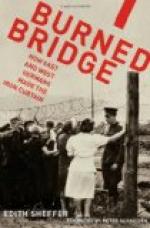“Our host,” Thompson observed, “is not quite the type one expects to find here—permanently. I understand he has been here a long time.”
“Fifteen years,” Tommy supplied cheerfully. “Deuce of a time to be buried alive, eh? Carr hasn’t got rusty, though. No. Mind like a steel trap, that man. Curious sort of individual. You ought to see the books he’s got. Amazing. Science, philosophy, the poets—all sorts. Don’t try arguing theology with him unless you’re quite advanced. Of course, I know the church is adapting itself to modern thought, in a way. But he’ll tie you in a bowknot if you hold to the old theological doctrines. Fact. Carr’s scholarly sort, but awfully radical. Awfully.”
“It’s queer,” said Thompson, “why a man like that should bury himself here so long. Is it a fact that he is married to a native woman? His daughter now—one wouldn’t imagine her—”
“No fear,” Tommy Ashe interrupted. “Carr’s got an Indian woman, right enough. They’ve got three mixed-blood youngsters. But his daughter—”
He gave Thompson a quick sidelong glance.
“Sophie’s pure blood,” said he. “She’s a thorough-bred.”
He said it almost challengingly.
CHAPTER VI
CERTAIN PERPLEXITIES
From the direction of the slough two shots sounded, presently followed by two more. Then the gleeful yipping of Tommy’s Ashe’s retriever, and Tommy’s stentorian encouragement:
“That’s the boy. Fetch him.”
Close upon this Mr. Thompson’s up-pricked ear detected another voice, one that immediately set up in him an involuntary eagerness of listening, a clear, liquid voice that called:
“Oh, Tommy, there’s another wounded one, swimming away. Quick!”
Pow! Tommy’s twelve-gauge cracked again. The two voices called laughingly back and forth across the slough, mingled with the excited barking of the brown dog as he retrieved the slaughtered ducks. After a time silence fell. Thompson’s nose detected an odor. He turned hastily to his stove. But he had listened too long. The biscuits in his oven were smoking.
That did not matter greatly in itself. It was merely one of a long procession of culinary disasters. He could not, somehow, contrive to prepare food in the simple manner of Mike Breyette’s instructions. If the biscuits had not scorched probably they would have been hopelessly soggy, dismal things compared to the brown discs Mike had turned out of the same oven. One was as bad as the other. Nothing seemed to work out right. Nothing ever tasted right. Only a healthy hunger enabled him to swallow the unsavory messes he concocted in the name of food.




